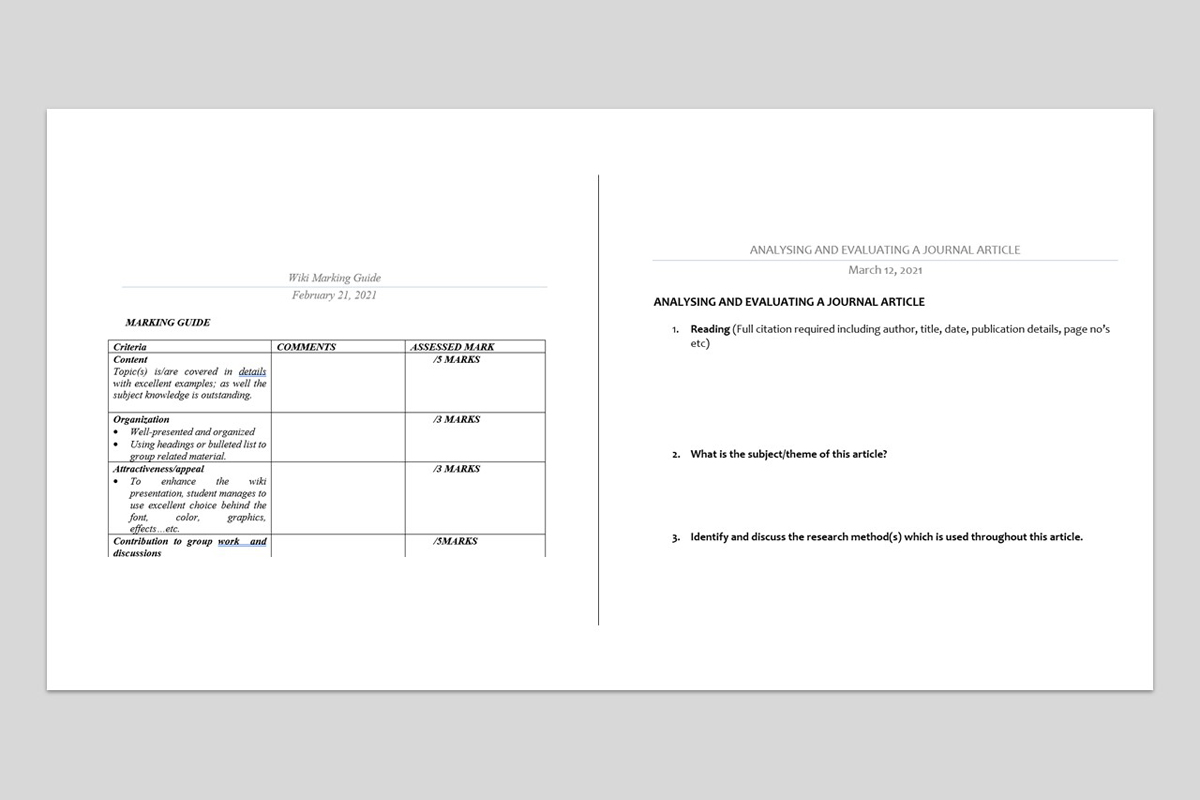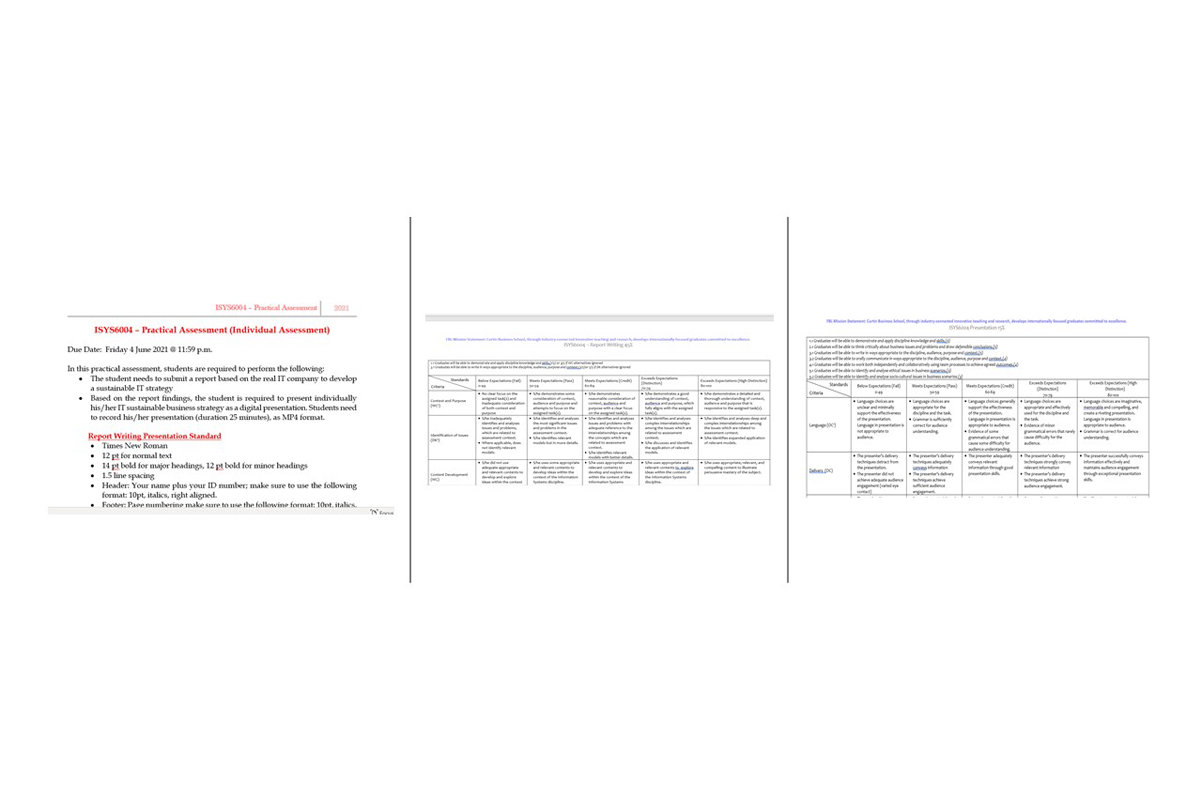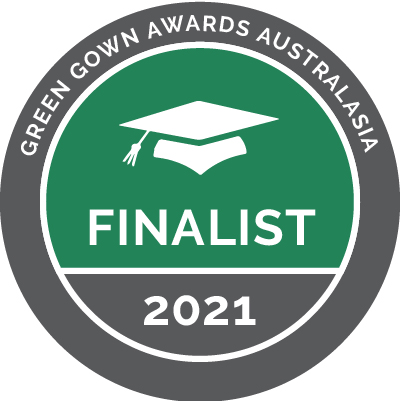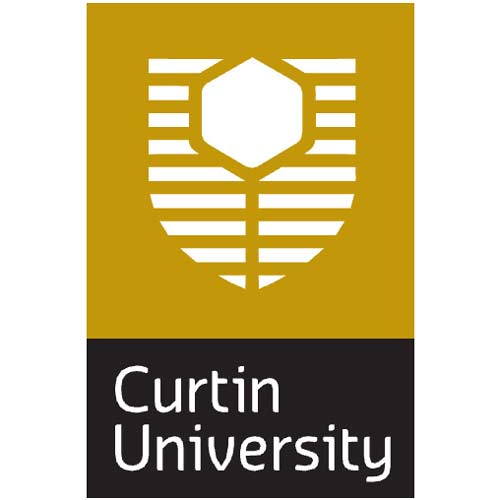Green Information Technology and Sustainability (GITS) (postgraduate unit project)
The aim of the project was to strengthen postgraduate students’ knowledge and awareness of Green IT (Information Technology) and sustainability Nowadays, more businesses and governments are adopting and integrating both Green IT and sustainability in their marketing and operational strategies to improve their reputation and establish uniqueness in the market, locally or globally. The unit was developed after the Global Financial Crisis 2008/2009, as business schools were amongst the entities accused of contributing to economic, societal and environmental failings. Feedback and assessment outcomes indicated that this unit increased students’ awareness of sustainability, and improved their personal and professional skills for their tertiary studies and their current and future workplaces.
Furthermore, students demonstrated their satisfaction with the unit assessment tasks which helped them to develop specific skills (cultural awareness, communication, cutting edge technology) and acquire an appreciation of and respect for the natural environment.
> The initiative
The GITS unit was derived from a unit initially developed and implemented in a French University for a multi-national cohort of graduate students.
Phase One: This unit was run in France six times, by the developer and facilitator Dr Theodora Issa. The development and implementation of this course (unit) faced several challenges. Following a telephone discussion with the International Affairs Personnel at the Business School in France, a subsequent face-to-face discussion with one of the professors who developed the unit in 2009 for a French university, and several exchanges of correspondence and telephone calls, the GITS unit was developed for Curtin University in Australia. The original course had been designed for and delivered to a multi-national cohort of students enrolled at a French Business School, which added to the complexity of the material to be covered. The diverse landscape (French partner, Australian developer and facilitator, and students from different parts of the world) provided a complex road map for the course’s (unit) development and facilitation. Nonetheless, through technology and perseverance from all stakeholders, it became easier to liaise and communicate throughout.
Phase Two: Upon the success of this unit, the Head of School at Curtin approached Theodora and Dr Tomayess Issa, asking them to adapt the contents of this unit for students with an IT background. Subsequently they jointly developed and implemented this unit. Later, Theodora handed over the responsibilities to Tomayess, but continues to advise on the unit, and occasionally is a guest speaker in GITS classes.
The GITS unit encourages students to examine and analyse issues related to Green IT and sustainability models, and the development and establishment of a new, sustainable strategy for Information Technology (IT). The GITS unit is aligned directly with the UN Sustainable Development Goals 7, 9 and 12 which are intended to create innovative sustainable technology, recycle, and reduce waste, save raw materials for future generations, and use clean and efficient energy. Lecturers took special care to ensure that the Unit Learning Outcomes were directly related to the goals of increasing students’ awareness of sustainability and environmental issues via the assessment tasks described on P.4 under procurement practices.
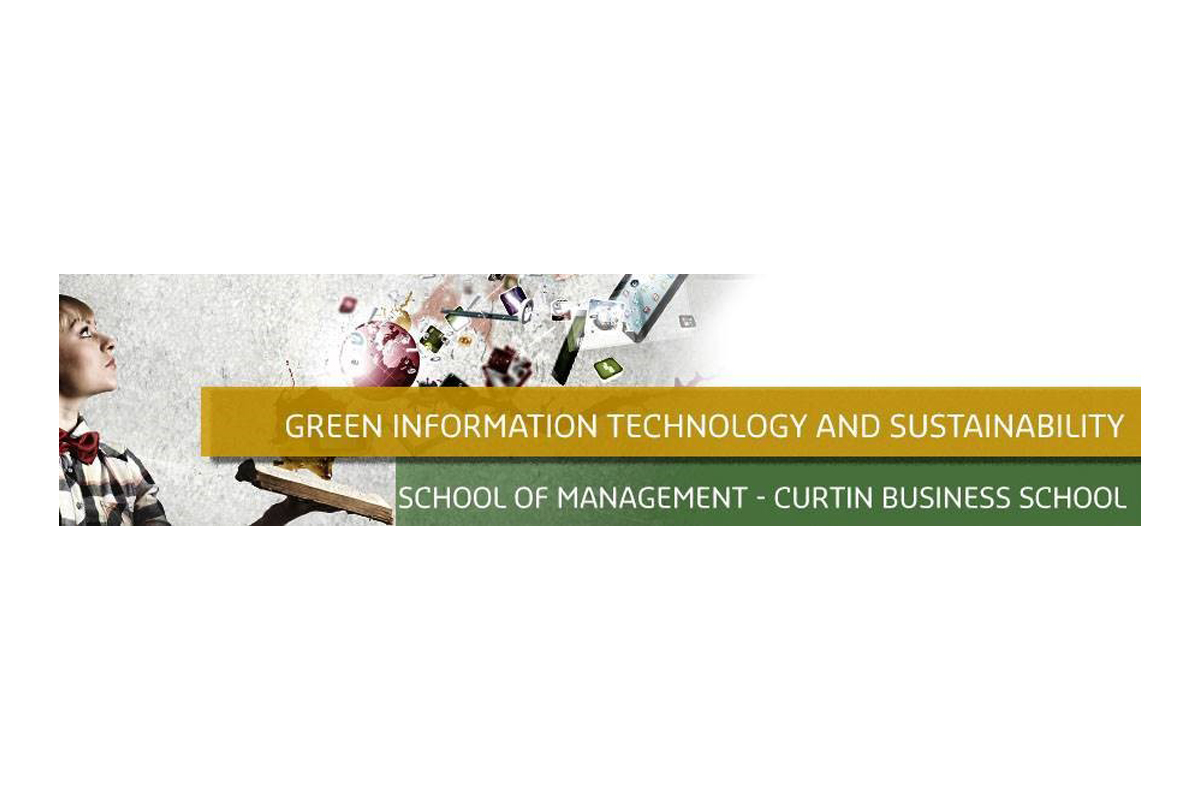
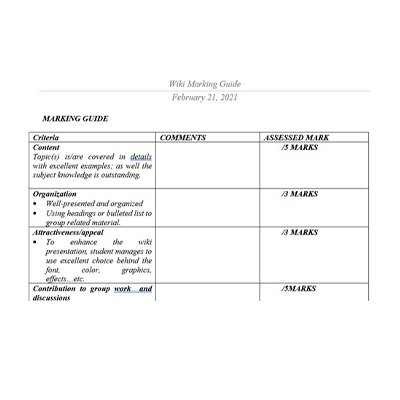
Over the years, this unit gave rise to several publications of benefit to the academic community:
Edited books:
- Issa, T., T. Issa, T. Issa, and P. Isaias. ed. 2020. “Sustainability Awareness and Green Information Technologies”. Switzerland: Springer International Publishing AG.
- Issa, T. B., P. Isaias, and T. Issa. ed. 2017. “Sustainability, Green IT and Education Strategies in the Twenty-first Century”. Switzerland: Springer.
Authored Book:
- Issa, T., and P. Teixeira Isaias. 2015. “Sustainable Design: HCI, Usability and Environmental Concerns”. London UK: Springer-Verlag London Ltd.
- The 2nd edition will be submitted to the publisher in November 2021
Book Chapters
- Issa, T. 2020. “e-Assessments via Wiki and Blog Tools: Students’ Perspective”, in Educational Networking: A Novel Discipline for Improved Learning Based on Social Networks Peña-Ayala, A., 235-268 Switzerland: Springer.
- Issa, T., T. Issa, and T. Issa. 2020. “Awareness, Opportunities and Challenges of Green IT: An Australian Perspective”, in Sustainability Awareness and Green Information Technologies Issa, T., T. Issa, T. Issa, and P. Isaias., 443-462 Switzerland: Springer International Publishing.
- Albahlal, A., T. Issa, T. Issa, and V. Chang. 2020. “An Exploration of Current Managers’ Attitudes in GCC Countries Regarding the Adoption of Green IT.” In Essential Issues in Corporate Social Responsibility First. Diaz, B. D., N. Capaldi, S. O. Idowu, and R. Schmidpeter., 339-352 Switzerland: Springer International Publishing.
- Al Shabban, L., and T. Issa. 2020. “Sustainability Awareness in Saudi Arabia.” In Sustainability Awareness and Green Information Technologies Issa, T., T. Issa, T. Issa, and P. Isaias., 101-131 Switzerland: Springer International Publishing.
- Sheikhmiri, M., and T. Issa. 2020. “Awareness Factors, Opportunities and Challenges of IoT Application in Australia.” In Sustainability Awareness and Green Information Technologies Issa, T., T. Issa, T. Issa, and P. Isaias., 271-320 Switzerland: Springer International Publishing.
- Duan, Y., T. Issa, T. Issa, and V. Chang. 2020. “Sustainable Cloud Computing in China.” In Sustainability Awareness and Green Information Technologies Issa, T., T. Issa, T. Issa, and P. Isaias., 359-373 Switzerland: Springer International Publishing.
- Mahajan, A., and T. Issa. 2020. “Australian Users’ Perspective of Green Blockchain Technology Adoption in Businesses.” In Sustainability Awareness and Green Information Technologies Issa, T., T. Issa, T. Issa, and P. Isaias., 375-408 Switzerland: Springer International Publishing.
- Issa, T., and T. Issa. 2019. “Report Writing Assessment for Postgraduate Students: Lecturer’s Perspective”, in Universities in the Networked Society Cultural Diversity and Digital Competences in Learning Communities Smyrnova-Trybulska, E., P. Kommers, N. Morze, and J. Malach., 89-101 Switzerland: Springer International Publishing.
Issa, T., and T. Issa. 2019. “CSR, Sustainability and Green IT in Higher Education: An Australian Perspective”, in Responsible Business in Uncertain Times and for a Sustainable Future. CSR, Sustainability, Ethics & Governance Capaldi, N., S. O. Idowu, R. Schmidpeter, and M. Brueckner., 89-106 Switzerland: Springer, Cham. - Issa, T. B. 2017. “Sustainability Perspective and Awareness Amongst Higher Education in Australia” in Sustainability, Green IT and Education Strategies in the Twenty-first Century”, Issa, T., P. Isaias, and T. Issa., 17-33 Switzerland: Springer.
- Issa, T. B., and T. Issa. 2017. “Changing the Students’ Mind-set via Sustainability”, in Sustainability, Green IT and Education Strategies in the Twenty-first Century Isaias, P., T. Issa, and T. Issa., 1-15 Switzerland: Springer.
Conference Papers
- Issa, T. 2019. “Sustainable Design Awareness in Australia”, in OZCHI’19: Workshop Designing Smart for Sustainable Communities: Reflecting on the Role of HCI for Addressing the Sustainable Development Goals, Dec 2, 2019, Perth – Australia: OzCHI.
- Issa, T. B., and T. Issa. 2017. “CSR, Sustainability and Green IT in Higher Education: An Australian Perspective, in 4th International Conference on CSR, Sustainability, Ethics & Governance, Jul 26, 2017, Perth, Western Australia.
- Issa, T., T. Issa, and V. Chang. 2013. “Sustainability and Green IT Education: Practice for Incorporating in the Australian Higher Education Curriculum”, in The Ninth International Conference on Environmental, Cultural, Economic and Social Sustainability, Jan 23, 2013, Japan.
- Issa, T., T. Issa, and V. Chang. 2011. “Green IT and sustainable development strategies: An Australian experience”, in The 12th International Conference of the Society for Global Business & Economic Development, Jul 21, 2011, Singapore: Society for Global Business & Economic Development (SGBED).
Journal Articles
- Alahmari, M., T. Issa, I. Theodora, and S. Z. Nau. 2019. “Faculty awareness of the economic and environmental benefits of augmented reality for sustainability in Saudi Arabian universities.” Journal of Cleaner Production 226: 259-269.
- Issa, T., T. Issa, and V. Chang. 2014. “Sustainability and Green IT Education: Practice for Incorporating in the Australian Higher Education Curriculum”. The International Journal of Sustainability Education 9 (2): 19-30
- Issa, T., V. Chang, and T. Issa. 2010. “Sustainable business strategies and PESTEL framework”. GSTF International Journal on Computing 1 (1): 73-80.
Editorship
- Special Issue “Technology Mobility” in the Journal of Information, Communication and Ethics in Society, Editors: Tomayess Issa, Pedro Isaias, and Piet Kommers Vol. 18, No. 2, 2020
- Special Issue “Digital Economy and the role of Technologies, People and Processes in Society” in the Int. J. Information and Communication Technology, Editors: Pedro Isaias, Tomayess Issa and Piet Kommers Vol. 16, No. 4, 2018
- Special Issue “The Impact of Smart Technology on Users and Society” Journal of Information, Communication and Ethics in Society Editors, Tomayess Issa, Pedro Isaias, and Piet Kommers Vol 14 Issue 4 2016
Conference:
- Tomayess Issa initiated the IADIS (International Association for the Development of the Information Society) conference for Sustainability, Green IT and Education, and this year is the 9th International Conference on Sustainability, Technology and Education 2021
> Environmental and social benefits
Benefits:
- Students obtained a greater awareness of Green IT and sustainability.
- Students became more aware of their actions and responsibilities as stewards of the planet.
- Students developed a sustainable Information Technology strategy for a real local and global company from Australia or overseas.
- Students created a YouTube video (i.e., v1, v2, v3, v4) to raise individual and community awareness of sustainability.
- Students developed and improved professional and personal skills via WIKI activities individually and in teams.
- Students shared, with their peers, information about their own country’s sustainability and Green IT awareness and initiatives, and this assisted students to learn about each other’s countries and their current position in terms of sustainability.
- Students completed their Master dissertations Green IT and sustainability (collecting primary data from their countries), and findings were published in journals, conferences, and book chapters.
- In 2020, two PhD students completed their degree, focusing on Green IT and sustainability. The GITS unit motivated them to undertake PhD studies in this area; both students received outstanding feedback from the PhD examiners.
> Leadership and engagement
- We share up-to-date knowledge and skills with our students.
- Creative assessment tasks have been developed for this unit, with each task designed to develop and/or improve specific professional and personal skills.
- Our formative feedback on activities and assessments helps to sustain students’ interest in and enjoyment of the unit, while giving them the knowledge and skills to succeed academically and in the workplace.
- A high number of students have been motivated to undertake post-graduate studies.
- Students completed their PhD degrees on GITS-related topics, and published their findings in journals, conferences, and book chapters.
> Wider societal impact
The development and delivery of this unit made a huge impact on the faculty. The mind-set of students was changed, and the majority of them completed their Master dissertations on topics presented in the GITS unit. This indicated the students’ desire to ameliorate the current situation and make a contribution towards saving the planet. Formal University feedback via “eVALUate” included comments such as these: “GITS is the most interested and motivated unit. It makes me able to think about the environment and save natural resources for future. Moreover, the teacher is also very motivational” and “In this unit I learned many things and I can implement in my daily activities. This unit is very beneficial as I become more sustainable towards the environment and the usage of natural resources such as water and electricity”. These comments are typical of the feedback received for this unit.

